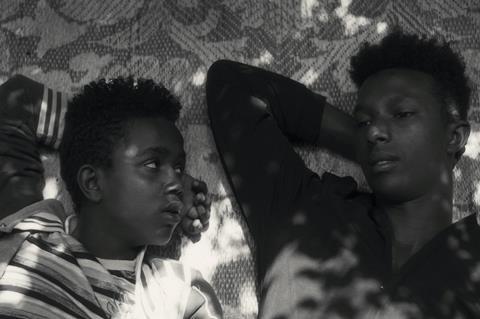Ethiopia’s lucrative khat crop inspires a hypnotic, immersive documentary glimpse into the country’s soul

Dir/scr: Jessica Beshir. US/Ethiopia/Qatar. 2020. 118 mins.
The khat plant provides the most lucrative cash crop in Ethiopia. The state of bliss that results from chewing its leaves is almost a national anti-depressant. In Faya Dayi the cultivation, harvest and consumption of khat becomes a glimpse into the soul of the country.
The combination of human stories and haunting imagery leaves a lasting impression
Jessica Beshir’s hypnotic, immersive and very beautiful documentary marks an impressive feature debut. Audience engagement may reflect a film that embodies all the challenges and the rewards of slow cinema, but a high-profile festival run has led to it being acquired by Janus for North America, with MUBI taking a number of international territories including the UK.
Faya Dayi’s meandering, unhurried approach requires you to slow down and adjust to the rhythms of a different pace and sensibility. A languid drowsiness envelopes much of the film. Sleeping dogs lie stretched out on nighttime roads, a young boy happily floats on the surface of calm water, wisps of smoke ascend from a fire, the flutter of a bird’s wings breaks the silence, a boy’s tear silently falls.
Beshir serves as writer, producer, director and cinematographer, and her striking, acutely observed monochrome images lie at the heart of film. The walled city of Harar with its narrow, winding network of streets is a solid presence in a picture that takes particular note of connections to the land and nature. Water is a recurring feature, from the shallow pools in which boys play to the cracked surface of a bone-dry lake bed where water once flowed. The growing, picking, transport and distribution of the khat is threaded through the film. It provides jobs, a thriving economy and distraction for the masses. Beshir captures images of men at work in the fields and in vast warehouses, leaves collected into bundles, sheaves carried on shoulders as the product is spread across the land.
Human connections require much more work on the part of the viewer. We are allowed to glimpse scraps of lives that emerge in tales of struggle, lost loves and anxiety over the future. There is a distinct generation gap between fatalistic older men and those youngsters who ponder whether it might be better to risk fleeing the country. “We shouldn’t have to perish in the deserts and the seas to change our lives,” says one. Another boy frets over the volatile shifts in temperament of a father at the mercy of khat. Yet, he too is drawn to the leaf and the state it induces. He has been told that the hazy high from khat (called Merkhana) is like watching films in your head.
Faya Dayi is a film that grows increasingly mournful as the diverse elements start to come together. Beshir contemplates some of the religious and spiritual significance attached to khat. We learn about a troubled land and how the khat crop is both an economic blessing and a human millstone. Personal experiences of torture, violence and repression are recounted.The fears of the Oromo people are acknowledged. There is little need to spell out why the use of khat is such a widely accepted means of escape from reality.
A running time close to two hours means that Faya Dayi risks overstaying its welcome, but the combination of human stories and haunting imagery leaves a lasting impression.
Production companies: Merkhana Films, XTR, Neon Heart Productions, Flies Collective
International sales: Cinetic Media, jason@cineticmedia.com
Producer: Jessica Beshir
Editing: Jeanne Applegate, Dustin Waldman
Cinematography: Jessica Beshir
Music: William Basinski, Adrian Aniol, Kaethe Hostetter















![[L-R]: Amanda Villavieja, Laia Casanovas, Yasmina Praderas](https://d1nslcd7m2225b.cloudfront.net/Pictures/274x183/6/4/1/1471641_pxl_20251224_103354743_618426_crop.jpg)








